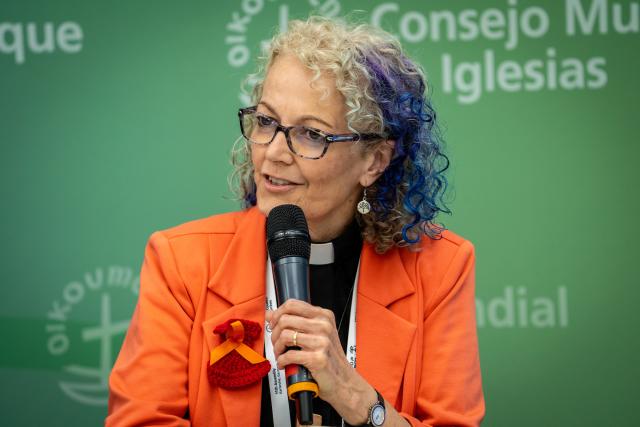Learning from other Christian groups is not only at the heart of the church’s history, says Sandra Beardsall; it’s crucial to its future

Sandra Beardsall is drawn to ecumenical engagement, she says, out of curiosity and conviction. She wants to know what she can learn from other Christians, and if, through an exchange of knowledge about God, they can become part of each other’s journey.
“I believe when we do not appear to be living together in visible unity, we undermine our witness to the gospel, to the good news of a generous God who loves all creation and draws all things to Godself,” she says.
“When, in the gospels, the disciples go to Jesus, upset that someone not of their group is curing people in Jesus’ name, Jesus tells them to calm down,” she says. “It can be hard to convince ourselves that other churches are at least as 'bold and daring' in their discipleship as we are, but Jesus tells us we are all part of one gospel project. That’s what the world needs to see, not our attempts to one-up each other in the ‘righteousness Olympics.’”
Beardsall is the United Church representative on the World Council of Churches (WCC) Faith and Order Commission, chairing the work on Nicaea 2025. The first global Christian council, the Council of Nicaea held in 325 CE is a key moment in the history of Christian faith and for today’s ecumenical journey. She notes that its commemoration is an opportunity for the Christian church worldwide to reflect on the current state of Christianity as it exists 1,700 years later.
Nicaea 2025 events include the Sixth World Conference of Faith and Order, which will take place in October 2025. The centre of the WCC’s activities this year, the conference brings together church leaders and theologians of different traditions, as well as a new generation of ecumenists under the theme “Where now for visible unity?” As well, the World Council of Churches is planning activities to mark the anniversary of Nicaea with Christian World Communions, member and other churches, national and regional organizations, and theological and ecumenical institutions.
What does the original Council of Nicaea have to teach us about ecumenism in 2025? According to Beardsall, the context of Nicaea in 325 should be an example of how the church should collaborate in 2025.
“[In 325] we have a humble religious sect, heavily populated by enslaved persons and heavy on women’s participation, only a decade after the end of a brutal imperial persecution. Now it finds its leaders gathered from the ends of a vast empire to sit together and find common cause on matters of faith and practice. These bishops in council managed both to imagine a unified Christianity and to struggle to a fragile consensus,” she reflects. “How did they do it? It took a committed leadership, group perseverance, personal flexibility, the willingness to work toward consensus, and most of all, an overwhelming desire that the Christian Church, in all its diversity, would be a shining example of the oneness of the Body of Christ. Can the churches rise to that task today?”
Beyond ecumenism is the idea of “visible unity”—not just saying that we work together as Christian churches, but showing it. This is evident among the denominations in Canada, Beardsall says, noting the examples of recognizing the validity of each other’s baptism rites, sharing ecumenical ministry in congregations across the country, and cooperating in KAIROS, chaplaincy, and theological education.
“We have what it takes, I think, to go to the next level. What we need is the will to do so,” she says. “We need the courage to conquer our fears, to believe that more togetherness will not dilute our faith.”
Visible unity is vital in an age when societal norms are tossed aside and international bodies are ignored and discredited. One goal of this Nicaea year, Beardsall says, is to invite the churches to work on finding a common date for all Christians to celebrate Easter. It’s a request she says may seem irrelevant in the grand scheme of things, until you consider that it is the Christians of the Middle East, especially of Palestine and Jerusalem, who want it most fervently.
“They need that common witness to strengthen their rightful claim to their ancient faith, their culture, their right to live on the land of their forebears,” she says. “Can Christians living and acting together bring down the tyrants of the world? We don’t know. But we can at the very least stand together with those who suffer. Whether we are weeping or dancing or praying, life is so much better when we do it together.”
—Sandra Beardsall is the United Church representative on the World Council of Churches Faith and Order Commission. She chairs the work on Nicaea 2025, the 1,700th anniversary of the world’s first Ecumenical Council.
The views contained within these blogs are personal and do not necessarily reflect those of The United Church of Canada.